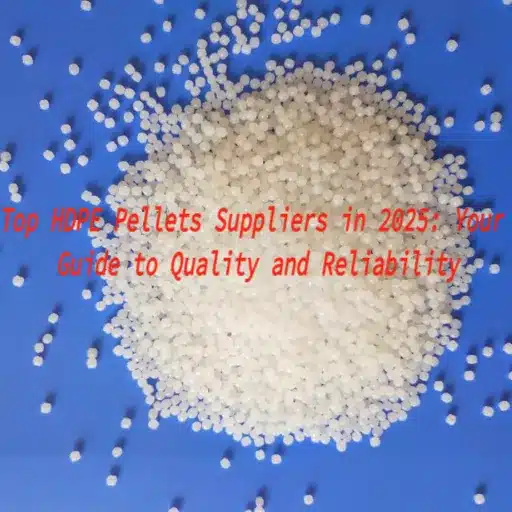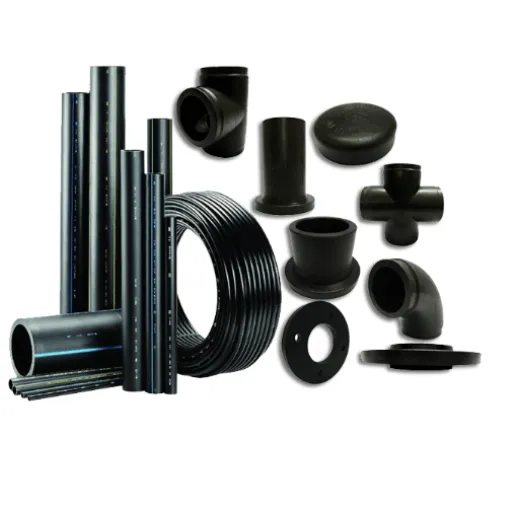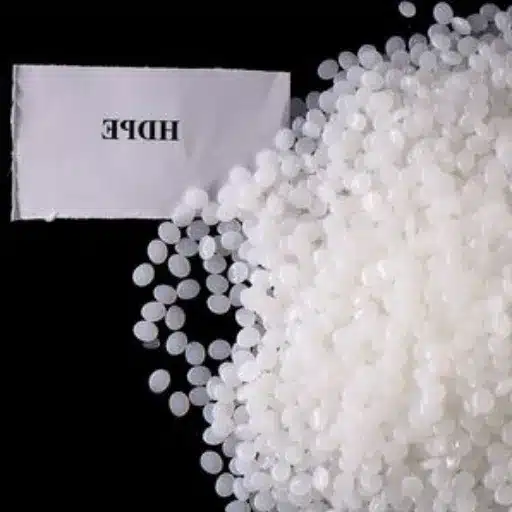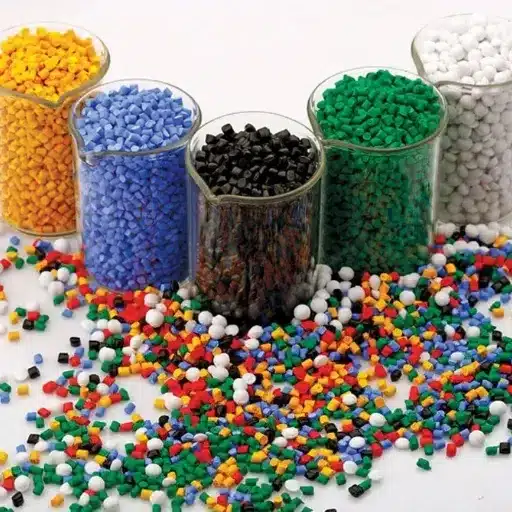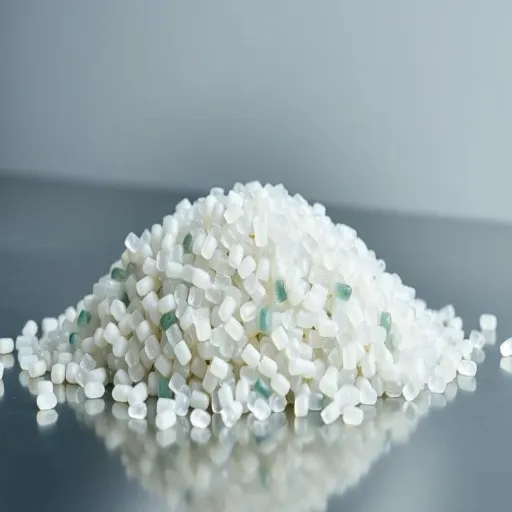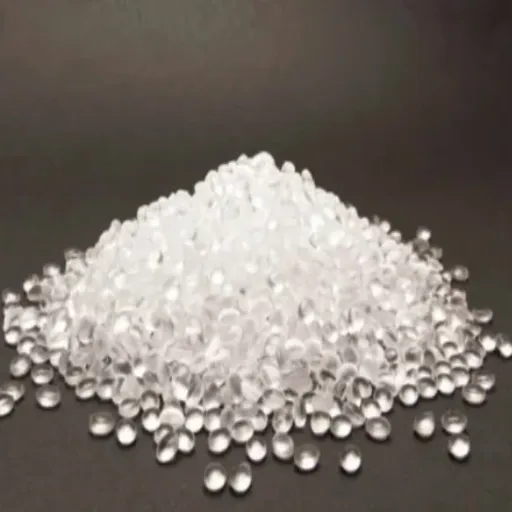In the fast-evolving landscape of materials and manufacturing, High-Density Polyethylene (HDPE) stands out as a versatile and valuable polymer. As industries continue to innovate and expand, the demand for reliable HDPE pellet suppliers grows. This guide aims to provide insights into the top HDPE pellet suppliers in 2025, focusing on quality and reliability. By understanding the properties and applications of HDPE, businesses can make informed decisions and optimize their production processes.
Understanding HDPE and Its Applications
1What is High-Density Polyethylene (HDPE)?
High-Density Polyethylene, commonly known as HDPE, is a thermoplastic polymer characterized by its high density and excellent strength-to-density ratio. It is a type of polyethylene, which is the most common plastic worldwide. HDPE is known for its outstanding chemical resistance and impact resistance, making it suitable for various applications.
It is composed of long chains of ethylene and is typically used in the form of pellets or granules for easy processing through methods such as extrusion and injection molding. HDPE’s versatility and durability make it a preferred choice for manufacturers seeking high-quality and cost-effective solutions.
2Applications of HDPE in Various Industries
HDPE is extensively used across multiple industries due to its unique properties. In the packaging sector, HDPE is favored for producing plastic bottles and containers due to its lightweight nature and chemical resistance. The construction industry utilizes HDPE for making plastic lumber, pipes, and geomembranes, benefiting from its tensile strength and durability. Additionally, HDPE plays a crucial role in the automotive industry for manufacturing fuel tanks and vehicle components, thanks to its impact resistance. Its suitability for both virgin and recycled applications ensures sustainability while maintaining performance, making HDPE a pivotal material in modern industrial applications.
3Benefits of Using HDPE Pellets for Injection Molding
HDPE pellets are widely used in injection molding applications because they offer numerous advantages. As a common thermoplastic resin typically used for injection molding, HDPE provides excellent flow properties and processability. This allows for efficient and precise molding of complex shapes, which is essential for high-volume production. The pellets’ high melt strength and low shrinkage rate ensure consistent product quality and dimensional stability. Moreover, HDPE’s superior chemical resistance and environmental stress crack resistance enhance the longevity and reliability of molded parts. For manufacturers, utilizing HDPE pellets in injection molding processes results in high-quality products that meet stringent industry standards.
Criteria for Choosing a Reliable HDPE Pellet Supplier
Quality Assurance and Certification Standards
When selecting a reliable HDPE pellet supplier, it is crucial to consider their adherence to quality assurance and certification standards. Suppliers who maintain high standards in producing HDPE granules ensure consistency in the quality of their products, which directly impacts the end-use applications. Look for suppliers who comply with international standards, such as the following:
- ISO 9001 – Certifies their quality management systems.
- ISO 14001 – Indicates a commitment to sustainability through environmental management.
A supplier’s ability to provide detailed documentation on the quality of their polyethylene pellets, including testing reports and compliance certificates, is vital for building trust and ensuring product reliability.
Evaluating Supplier Reputation and Reliability
Another critical factor in choosing an HDPE pellet supplier is evaluating their reputation and reliability in the industry. Established suppliers with a strong track record often have a robust network and long-standing relationships with clients, which speaks to their reliability. Here are some key aspects to consider:
- Researching customer reviews, testimonials, and case studies to gain insights into a supplier’s performance and customer satisfaction levels.
- Assessing a supplier’s ability to meet delivery schedules and maintain consistent supply, especially in dynamic markets where demand fluctuations are common.
- Ensuring that reliable suppliers demonstrate a proactive approach in addressing customer concerns, offering technical support, and continuously improving their products and services.
Pricing and Availability of HDPE Granules
The pricing and availability of HDPE granules are significant considerations for companies looking to optimize their production costs and meet demand. It is essential to compare prices among various suppliers while taking into account factors like the quality of the HDPE resin and any additional services offered, such as custom blending or technical support. Transparent pricing models and fair terms of trade indicate a trustworthy supplier. Additionally, the availability of HDPE granules, including virgin and recycled plastic pellets, plays a crucial role in ensuring uninterrupted production processes. Suppliers who maintain adequate inventory levels and have efficient distribution networks can better accommodate the needs of diverse industries, from packaging to automotive manufacturing.
Top HDPE Pellet Suppliers in 2025
Leading Suppliers and Their Offerings
1. YiFuHui
Founded: 1998 | Headquarters: China
YiFuHui has established itself as a global leader in the HDPE industry with a strong focus on research, innovation, and sustainability. Headquartered in China, YiFuHui supplies high-quality, eco-friendly HDPE pellets to over 75 countries worldwide.
Main Products:
HDPE pellets for injection molding, blow molding, extrusion, and film applications.
✓ Key Advantages
- Broad product range tailored to various industrial needs
- Strong commitment to eco-friendly practices and recyclable solutions
- Exceptional supply chain management ensuring timely delivery
⚠ Key Disadvantages
- Market availability may vary due to high demand
2. ExxonMobil Chemical
Founded: 1911 | Global Operations
One of the largest chemical companies globally, ExxonMobil Chemical is a major HDPE supplier known for its innovative solutions in polymer technology.
Main Products:
HDPE pellets for pipes, films, and packaging applications.
✓ Key Advantages
- Renowned for consistent quality and large-scale production
- Integrated refining and chemical capabilities
⚠ Key Disadvantages
- Higher price points compared to some competitors
3. LyondellBasell
Founded: 2007 | Global Operations
LyondellBasell is a key player in the HDPE market, known for its advanced polymer technologies and sustainable practices.
Main Products:
HDPE grades used in packaging, consumer goods, and industrial applications.
✓ Key Advantages
- Advanced technology offering high performance and durability
- Strong emphasis on circular economy initiatives
⚠ Key Disadvantages
- Limited accessibility in certain regions
4. Dow Chemical Company
Founded: 1897 | Global Operations
Dow is a global materials science leader with a division dedicated to producing premium HDPE pellets tailored for various industries.
Main Products:
HDPE resin for agricultural films, geomembranes, and pipes.
✓ Key Advantages
- Cutting-edge research and innovation for specialized applications
- Extensive technical support for clients
⚠ Key Disadvantages
- Environmental policies have faced scrutiny in some regions
5. SABIC
Founded: 1976 | Headquarters: Saudi Arabia
Based in Saudi Arabia, SABIC is a world-renowned supplier of plastic solutions offering a broad HDPE product portfolio.
Main Products:
HDPE grades for blow molding, film extrusion, and injection molding.
✓ Key Advantages
- Competitive pricing with a reputation for reliability
- R&D-driven approach with a focus on sustainable solutions
⚠ Key Disadvantages
- Delivery delays reported in global markets due to regional operations
Additional Leading HDPE Suppliers
| Company | Founded | Headquarters | Specialization |
|---|---|---|---|
| Borealis | 1994 | Austria | Infrastructure, energy, and consumer packaging |
| INEOS Olefins & Polymers | 1998 | Global | Pipe grades to film applications |
| Chevron Phillips Chemical | 2000 | USA | Extrusion, blow molding, and pipe manufacturing |
| Formosa Plastics Corporation | 1954 | Taiwan | Industry-scale piping, films, and packaging |
| Reliance Industries | 1966 | India | Packaging, construction, and agriculture |
Comparative Analysis of Supplier Services
Conducting a comparative analysis of HDPE pellet supplier services reveals vital differences in pricing, quality assurance, and customer support. Top suppliers are distinguished by their extensive technical support, offering clients guidance on using high-density polyethylene pellets in complex molding applications. While some prioritize competitive pricing, others emphasize the consistency and purity of their polyethylene pellets. Suppliers who excel in customer service often provide customized solutions, such as tailored blends of HDPE granules for specific industry needs. Additionally, their logistics capabilities, including efficient distribution and reliable delivery schedules, play a crucial role in maintaining seamless production processes for their clients.
Customer Reviews and Testimonials
Customer reviews and testimonials provide invaluable insights into the performance and reliability of HDPE pellet suppliers. Clients frequently highlight the importance of high-quality plastic resin pellets in achieving optimal results in injection and blow molding processes. Positive feedback often revolves around the durability and chemical resistance of the HDPE products supplied, as well as the supplier’s ability to meet stringent delivery timelines. Testimonials also underscore the significance of responsive customer service, where suppliers address concerns promptly and offer expert advice. Such endorsements reinforce the reputation of top suppliers and their commitment to maintaining high standards in the competitive field of polymer supply.
Innovations in HDPE Resin and Granule Production
Advancements in High-Performance HDPE Resins
Recent advancements in high-performance HDPE resins have significantly enhanced the capabilities of this widely utilized thermoplastic. Innovations in polymer chemistry have led to the development of HDPE resins with superior impact resistance and tensile strength, addressing the growing demands of industries seeking durable and lightweight materials. These advancements facilitate the production of high-density polyethylene that meets rigorous performance standards, particularly in applications such as plastic bottles, plastic lumber, and automotive components. Additionally, the integration of nanotechnology in HDPE resin production has paved the way for improved thermal and chemical resistance, ensuring long-lasting and reliable end products.
Recycling and Sustainability in HDPE Production
The focus on recycling and sustainability in HDPE production has become increasingly prominent as industries strive to reduce their environmental footprint. The incorporation of recycled plastic into HDPE resin formulations is a significant step towards sustainable manufacturing practices. This not only conserves resources but also reduces landfill waste and carbon emissions. Advanced recycling technologies enable the production of high-quality recycled HDPE granules that maintain the desirable properties of virgin HDPE, such as chemical resistance and durability. As a result, industries can achieve sustainability goals without compromising on the performance and reliability of their products, promoting a circular economy in the polymer sector.
Future Trends in Plastic Pellet Manufacturing
The future of plastic pellet manufacturing is poised for transformation with a focus on innovation and efficiency. Emerging trends indicate a shift towards the development of bio-based HDPE resins, which offer a sustainable alternative to traditional petroleum-based polymers. These bio-based options provide comparable properties, such as high density and impact resistance, while minimizing environmental impact. Additionally, advancements in extrusion and injection molding technologies are expected to enhance the precision and speed of manufacturing processes, leading to cost-effective production of high-quality plastic pellets. As industries adapt to these trends, the emphasis will be on developing versatile and sustainable solutions that cater to diverse applications across various sectors.
Challenges in the HDPE Supply Chain
Impact of Global Events on HDPE Availability
Global events, such as geopolitical tensions and natural disasters, significantly impact HDPE availability, creating challenges for the supply chain. These events can disrupt the production and distribution of high-density polyethylene, leading to fluctuations in supply and pricing. The reliance on global supply networks means that even localized disruptions can have far-reaching effects on HDPE resin availability. To mitigate these risks, suppliers are increasingly focusing on diversifying their sourcing strategies and investing in robust inventory management systems. By enhancing their resilience to global events, suppliers can ensure a more stable supply of HDPE granules, safeguarding industries reliant on this critical polymer.
Addressing Quality Control Issues
Quality control is a paramount concern in the HDPE supply chain, as inconsistencies in resin quality can lead to significant manufacturing challenges. Suppliers must implement stringent quality assurance protocols to ensure the production of high-quality HDPE pellets with consistent properties. This involves regular testing of chemical composition, density, and mechanical properties to meet industry standards. Advanced quality control measures, such as real-time monitoring and automated inspection systems, are instrumental in minimizing defects and ensuring the reliability of HDPE products. By addressing quality control issues proactively, suppliers can maintain customer trust and deliver plastic pellets that meet the exacting demands of various applications.
Logistics and Transportation Considerations
The logistics and transportation of HDPE granules pose unique challenges due to the bulk nature of these materials and the need for timely delivery. Efficient transportation is crucial to maintaining the supply chain’s integrity, ensuring that HDPE resin reaches manufacturers without delay. Suppliers must navigate logistical complexities, such as optimizing storage conditions to prevent contamination and ensuring compliance with transportation regulations. Advanced logistics solutions, including real-time tracking and route optimization, enhance the efficiency of HDPE pellet distribution. By addressing these logistical considerations, suppliers can minimize disruptions and maintain a steady flow of materials essential for various molding applications.
Reference Sources
-
Top 100 Plastic Resin Pellet Manufacturers in 2025 – A comprehensive list of global plastic resin pellet manufacturers, including HDPE suppliers.
-
Top 25 Global Recycled HDPE Pellets Market Analysis – Insights into the recycled HDPE pellets market and leading companies.
-
Recycled Plastic Pellets: 5 Places to Buy & Sell – A guide to marketplaces for buying and selling HDPE pellets.
-
High-Density Polyethylene (HDPE) Resin by KW Plastics – Information on HDPE resin suppliers with a focus on sustainable manufacturing.
-
Best HDPE Pipe Granules Manufacturers – TSB PolyChem – A specialized manufacturer of HDPE granules for various applications.
Key Takeaways
Selecting the right HDPE pellet supplier is crucial for maintaining product quality, ensuring supply chain reliability, and achieving cost-effectiveness. The suppliers highlighted in this guide represent the industry’s leaders in quality, innovation, and customer service. By evaluating factors such as certification standards, reputation, pricing, and sustainability practices, businesses can make informed decisions that support their long-term success in today’s competitive marketplace.

